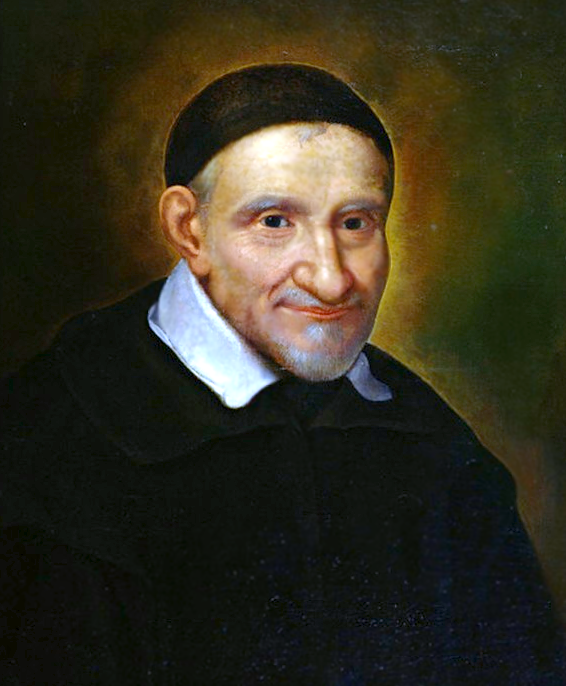
Saint Vincent de Paul: A Legacy of Service to the Poor
|
|
Time to read 4 min
|
|
Time to read 4 min
In the bustling streets of 17th century Paris, amidst a backdrop of poverty and inequality, a remarkable figure emerged: Vincent de Paul. More than just a saint, Vincent was a revolutionary force who ignited a movement of compassion that continues to illuminate the lives of millions to this day.
Born in 1581 in a small French village, Vincent's path wasn't initially set for sainthood. Early life saw him pursue a comfortable life as a lawyer. However, a chance encounter with the plight of the impoverished on a missionary journey irrevocably altered his course. Witnessing firsthand the suffering of those forgotten by society, Vincent felt a profound shift in his calling. He dedicated himself to serving the "galley slaves," those condemned to a life of brutal servitude on French warships.
Vincent's unwavering commitment extended beyond individual acts of charity. He recognized the systemic nature of poverty and the need for a more sustainable approach. This led him to establish the "Confréries de Charité" (Ladies of Charity) - a revolutionary concept for its time. These laywomen, empowered by Vincent's vision, played a pivotal role in organizing community kitchens, providing clothing and shelter, and visiting the sick in their homes.
In 1625, Vincent co-founded the Congregation of the Mission (Lazarists), a religious order dedicated to serving the marginalized. The Lazarists, inspired by Vincent's spirit of humility and service, focused on rural communities, preaching missions, and establishing schools for the poor.
Vincent's vision extended beyond national borders. He recognized the universal nature of suffering and advocated for the humane treatment of prisoners. He challenged societal norms by advocating for the education of girls, a radical notion at the time.
Throughout his life, Vincent remained grounded in the belief that faith needed to be translated into action. He emphasized the importance of "seeing Christ in the poor," recognizing the inherent dignity and worth of every human being. This philosophy, known as Vincentian charism, continues to be the cornerstone of organizations inspired by his work.
The Legacy Lives On
Today, Saint Vincent de Paul's legacy extends far beyond 17th century France. The Society of Saint Vincent de Paul (SVdP), a global network of volunteers, embodies his spirit of service. Present in over 150 countries, SVdP conferences work tirelessly to alleviate poverty and suffering in their communities.
From providing food and clothing to offering financial assistance and companionship, SVdP volunteers strive to uphold Vincent's core principles: respect for the dignity of those served, a collaborative approach to problem-solving, and a commitment to long-term solutions rather than mere handouts.
A Life of Service
Vincent's life offers a blueprint for anyone seeking to make a difference in the world. Here are some key takeaways:
The Power of Witness: A single encounter with suffering can ignite a lifelong commitment to service. Remain open to the needs of those around you.
Beyond Charity: Recognize the systemic nature of poverty. While individual acts of kindness are important, long-term solutions require addressing root causes.
Empowering Others: Vincent empowered the Ladies of Charity and the Lazarists to become active agents of change. Identify and build upon the strengths and resources within your community.
Advocacy: Don't shy away from speaking out against injustice. Advocate for policies that promote equality and opportunity.
Faith in Action: Vincent believed that faith should manifest in concrete acts of service. Find ways to translate your beliefs into tangible actions to help those in need.
A Continuing Mission
Saint Vincent de Paul's life story serves as a powerful reminder that even one person can make a world of difference. By embracing his principles and actively engaging with the needs of those around us, we can all contribute to building a more just and compassionate world. The Society of Saint Vincent de Paul stands as a testament to his enduring legacy, offering a platform for individuals to answer the call to service.
Whether volunteering your time, donating resources, or simply practicing empathy in your daily interactions, there are countless ways to embody the Vincentian spirit. The fight against poverty and injustice continues, and the lessons gleaned from Saint Vincent de Paul's life remain as relevant today as ever.
Saint Vincent de Paul's life serves as a powerful reminder that even ordinary individuals can make an extraordinary impact. By embracing compassion, taking action, and fostering a spirit of human connection, we can all contribute to a more just and equitable world.
Conclusion
The world Saint Vincent de Paul inhabited was vastly different from ours, yet the struggles of poverty and marginalization persist. His legacy offers not just a historical account, but a blueprint for action in the 21st century.
We are bombarded daily with news of global challenges, leaving us feeling overwhelmed and powerless. Saint Vincent's story reminds us that change begins with a single step, a single act of compassion. By embracing his core principles – respect, collaboration, and long-term solutions – we can empower ourselves and our communities to tackle the issues closest to home.
The legacy of Saint Vincent de Paul isn't confined to dusty history books. It's a vibrant call to action, urging us to bridge the gap between empathy and action. Let his life inspire us to become active participants in building a more just and compassionate world, one where the forgotten are no longer left behind.